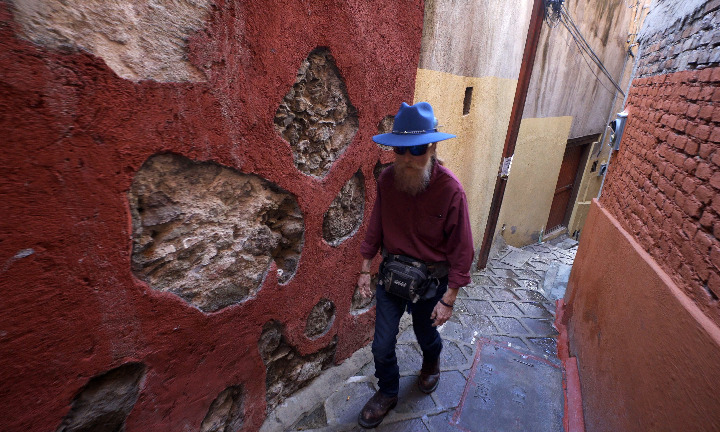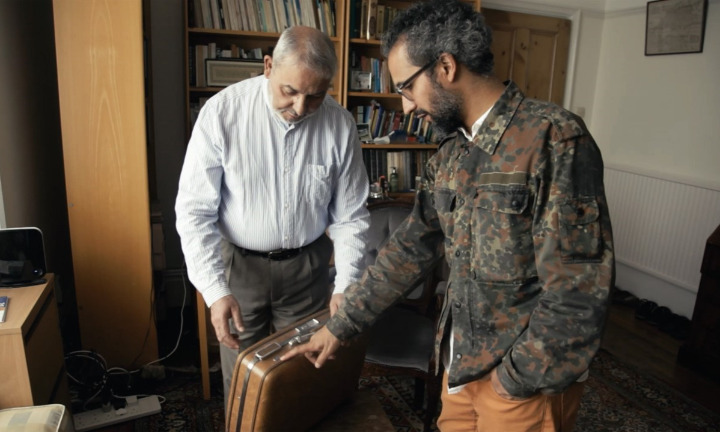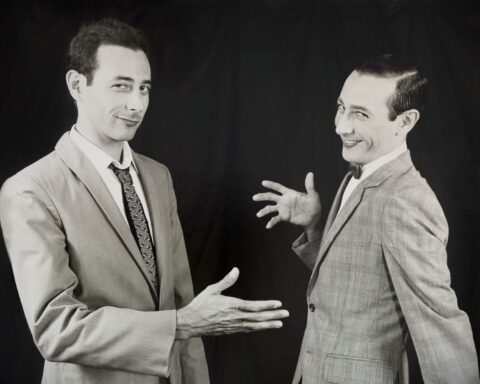Infamous hacktivist Commander X (Christopher Doyon) may frequently refer to himself as the superhero Batman, but he comes across more like a displaced Iron Man. Here’s a man who uses his computer like a suit of armour when combating the evils of the world, while never missing a moment to promote his own sense of grandeur. At first it seems odd that this frequently homeless cyberwarrior would covet the media spotlight while fleeing the FBI. However, as one dives into Gary Lang’s documentary The Face of Anonymous, it becomes clear that there is a part of Commander X that loves the attention. He clearly enjoys the sense of satisfaction that comes with debunking expectations of those who frequently underestimate him based on his scruffy appearance and circumstances.
To those who unknowingly passed him on the streets of Toronto, Doyon was nothing more than a homeless man. No one would have suspected that he was a fugitive on the run, one affiliated with the online group Anonymous. His long white beard and thin physique allowed him to hide in plain sight. His harmless appearance hid the power he wielded when behind his trusty laptop.
Understanding the potential of computers to revolutionize the world at an early age, Doyon would spend hours learning everything there was to know about the technology. While his interest in activism came years later, thanks to one of the many Grateful Dead concerts he attended, he never thought of merging his two passions until he came across a story in which Anonymous had hacked into an organization that provides support to those with epilepsy.
The thought of a group of online hackers having the ability to harm those miles away angrily propelled Doyon into action. His goal was to infiltrate Anonymous and take them down. However, what he found was a leaderless group of individuals who, while conducting offensive and racist pranks, offered a sense of community. A bond that was strengthened further when they linked arms in their online war with Scientology over issues related to freedom of speech.
Seeing the potential to make meaningful change, Doyon used his rising status in the group, under the online handle Commander X, to push Anonymous towards activism that would have impact in the real world. He was one of the instrumental voices that pushed the online network of hackers into helping protesters in the Arab Spring and temporarily crippling credit card companies that dared to silence Julian Assange’s Wikileaks. It was the latter that thrust Commander X into the media spotlight as he was one of the few members of the group willing to speak publicly about the FBI raids and the court cases they tried to build against the organization.
It is easy to see why the media and a filmmaker such as Lang would be drawn to a figure like Commander X. There is something inherently charming, and equally odd, about the way he navigates the world. On one hand he is a man who understands the importance of standing up for those being oppressed, regardless of whether the methods used are legal or not. On the other, he is a man who is often the maker of his own problems. As his lawyer notes at one point in the film “X is good at giving attorney’s ulcers.” Like a magician who cannot help but let you know how he pulled the rabbit out of the hat, Commander X constantly needs to let people know he is the smartest person in the room.
While Lang’s film does not dispute Doyon’s intelligence, it does raise questions about how his legacy will be viewed. Is he an unsung hero who fought the system every step of the way? A man who simply lived life on his own terms? A reckless figure who indulges in insane actions–his story about traveling to Mexico to seek asylum is just wild–that few would dare attempt? Or some combination of all these things?
In highlighting such a fascinating individual, The Face of Anonymous exposes the complex nature of online activism. While organizations like Black Lives Matter have used technology such as social media to mobilize grass roots activism, Anonymous’ path was much darker. As Lang’s documentary shows, there was a reluctance from key figures in Anonymous to uses their power for good. They were initially content to use their power and privilege to disrupt systems for their own amusement. The last thing they cared about was holding others or themselves accountable.
As off-beat as Doyon may come across at times, one cannot help but wonder what Anonymous might have become had he not held their feet to the social justice fire. Of course, as several Anonymous member state in the film, there were those who saw him as a hinderance to the organization more than anything else.
While Lang does not delve deeply into the lasting ramifications of Anonymous’ impact on online culture, or the sense of self-importance the group fostered, the film effectively captures how Commander X became the unlikely face of a movement. Despite the documentary being presented in a straightforward fashion, there is no denying that he has lived a life stranger than fiction.
In an age where the online world is fostering hate and pushing fake conspiracies, individuals like Commander X feel like a rarity. He’s a hacker who always saw the potential for the internet to uplift society rather than tear it apart.
The Face of Anonymous has its Canadian premiere at Hot Docs 2021.
Visit the POV Hot Docs Hub for more coverage from this year’s festival.
Update: The Face of Anonymous airs on TVO May 25 at 9:00 pm EST.














